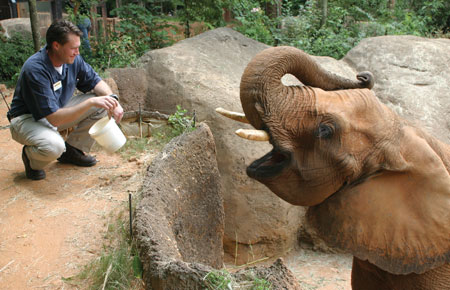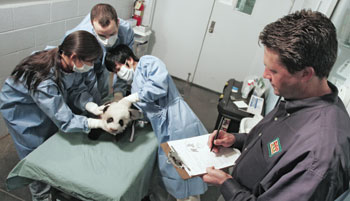| Goolsby grads on the fast track | Help for the struggling | Recognition of contributors |
| Home Forethought President's Message Campus Buzz Feature Stories Re:Search The Score Alum News Yesteryear | ||
Remember those unforgettable college experiences? Like the time you and your favorite professor returned to camp after collecting tropical frogs in an African rainforest, and then got mugged and carjacked?
|
|
Fortunately for you, that's not your memory, unless you're Dwight Lawson or biology Chair Jonathan Campbell.
While on a field trip during Lawson's sojourn to complete a master's degree in 1992 and a Ph.D. in quantitative biology in 1999, the duo returned to camp only to be greeted by three armed thugs. Lawson and Campbell first handed over their wallets and passports, then all of their extra clothes. The crooks took off in the twosome's newly purchased Land Cruiser.
Dr. Lawson's reminiscences come freely during a Georgia-to-Texas cellphone conversation a few days after Thanksgiving. As he makes his short morning commute, he often reflects on exactly how he scored a job that puts him in places so wild that his workplace can seem like a zoo.
|
|
On many days it is precisely that.
In his seventh year at Zoo Atlanta, Lawson is vice president of animal programs and science. What that means for him and his research staff is full days spent improving animal welfare throughout the 40-acre zoo, as well as securing the future of endangered animals worldwide.
"No matter what job you do, it can be mundane day to day," said the married-with-no-kids Lawson. True enough. Like other white-collar professionals, he manages a budget and depends on a computerized calendar marked with more than a few meetings.
After this interview, he'll do the board-meeting thing to determine how the marketing folks can best promote the zoo's warthog and meerkat exhibits opening this spring. Once that meeting adjourns, he will prepare for the weekly course he teaches as an adjunct professor at Georgia State University.
Oh, and there's that afternoon appointment with former U.S. Ambassador Andrew Young, an avid Zoo Atlanta supporter.
Lawson's tasks have included a private tour for former President Jimmy Carter and his grandson. He recently visited Thailand for a giant panda conference, while fitting in one of his personal interests: the conservation of turtles in Southeast Asia.
Dig through his day planner and you'll find a trip to a Tennessee zoo to watch an artificial insemination procedure on an elephant, and a talk on turtle conservation at a New York university.
"Right now we're planning new exhibits for the spring, whether or not to move the zoo, and how and when the new panda cub will go on exhibit," he said of one of Zoo Atlanta's newest celebrities. In early September the zoo's giant panda, Lun Lun, gave birth to the only panda cub born in the United States in 2006. Lawson served as spokesman, which was complicated by a protracted labor, whipping the news media into a frenzy.
"I do step back sometimes so as not to take what I do for granted," he said. "How often do you get to sit in the middle of an emotional roller coaster, and at the end you get to watch a giant panda give birth, or check on how a lion is doing, and you’re right there next to it?"
It's an experience he deserves, say those who know him.
Lawson has worked a lifetime to put himself next to the animals, says Dr. Campbell, who served as Lawson's supervising Ph.D. professor. After earning a biology degree from the University of Pennsylvania, Lawson learned of UT Arlington's biology program—and of Campbell, an internationally recognized herpetologist.
Under Campbell's watch, Lawson spent four-plus years researching in the jungles of Cameroon in West Africa. He captured and cataloged untold species of snakes and frogs, ranging from newly discovered, to endangered, to just plain interesting. He was charged by buffaloes, bitten by snakes and stricken with malaria four times, twice while fighting typhoid fever.
He also seized a jungle opportunity that would bring him to his current position.
"It was Dr. Campbell who let me manage a field conservation project for the Bronx Zoo at the same time I was doing my work in Africa," Lawson said. "It was a hugely formative experience that he worked to bring to me."
The experience, Campbell modestly agrees, helped "skyrocket" his former student to the higher echelons of animal management, "but it's more than that. He's always been inclined to work with live animals, and he's also been interested in conservation, which is one of the most worthwhile endeavors you can be involved with these days.
"Dwight just expects a lot of things to happen, and as a result, they do. Plus, his department is different than what you might find at other zoos. He's got a team of people, university-educated, doing research and other things." (Among other Ph.D. zoo colleagues, Lawson recruited Joseph Mendelson, a 1992 UT Arlington biology graduate, as curator of herpetology at Zoo Atlanta.)
A youthful 40, Lawson's job requires a résumé that most his age lack. His good humor is tempered with modesty, two traits Campbell believes have opened jungles and borders for his former student. Whether it's going abroad for conferences or creating zoo habitats for endangered gorillas, Lawson has become one of the nation's most active zookeeping professionals.
"He's very goal-oriented, he gets along well with other people, and he's a very good ambassador for what he wants to do," Campbell said.
Indeed. Zoo Atlanta is a participant in the AZA's Species Survival Program with efforts for the red panda and the Sumatran tiger, one of the world's most endangered animals. Other significant animal exhibits include Sumatran orangutans, black rhinos, African Savanna elephants, Komodo dragons, and more than 400 amphibians and reptiles.
"The zoo world is evolving," said Lawson, a 2006 UT Arlington Distinguished Alumnus. "It's going from that sterile, prison-cell type of cage to the progressive exhibits and advances in animal care and welfare, not only in captivity, but also the wild."
And a human advocate like Lawson might be just the ticket for animals everywhere.
He shrugs off any compliments.
"I'm still trying to figure out what I want to be when I grow up," he said. "Right now, I'm anxious to see what I can do to make zoos better."
— David Van Meter
| Archives
| Alumni Association |
Giving to UT Arlington | UT
Arlington Home Copyright © 2007 UT Arlington Magazine. All rights reserved. |


